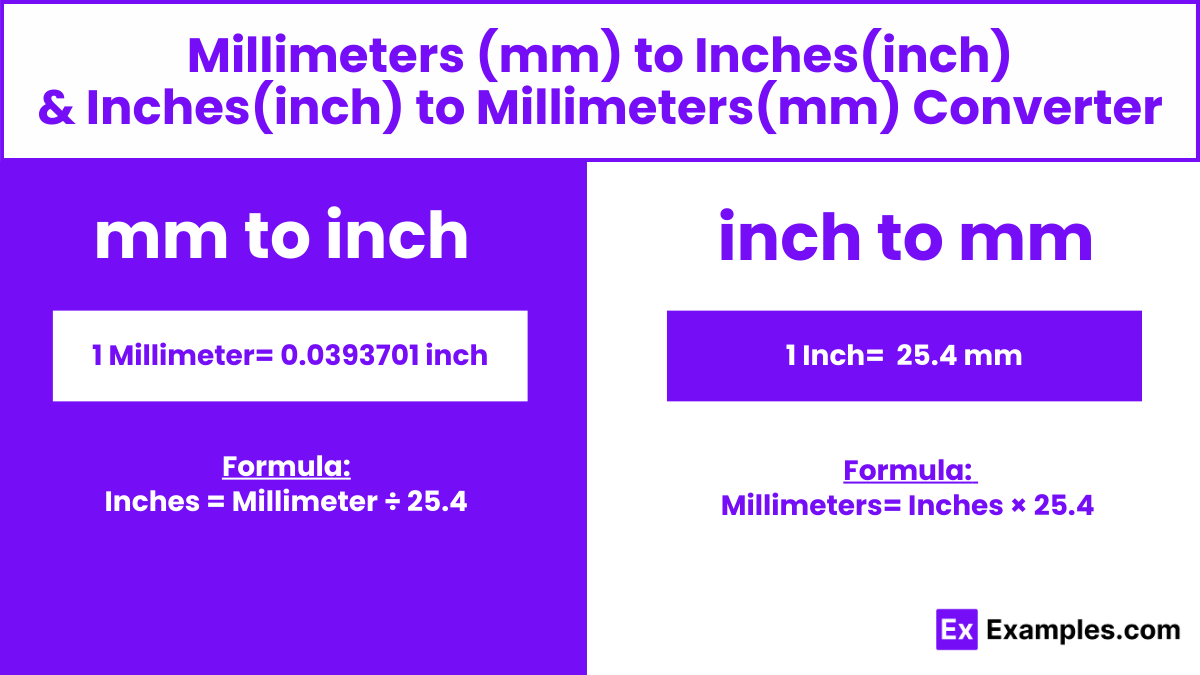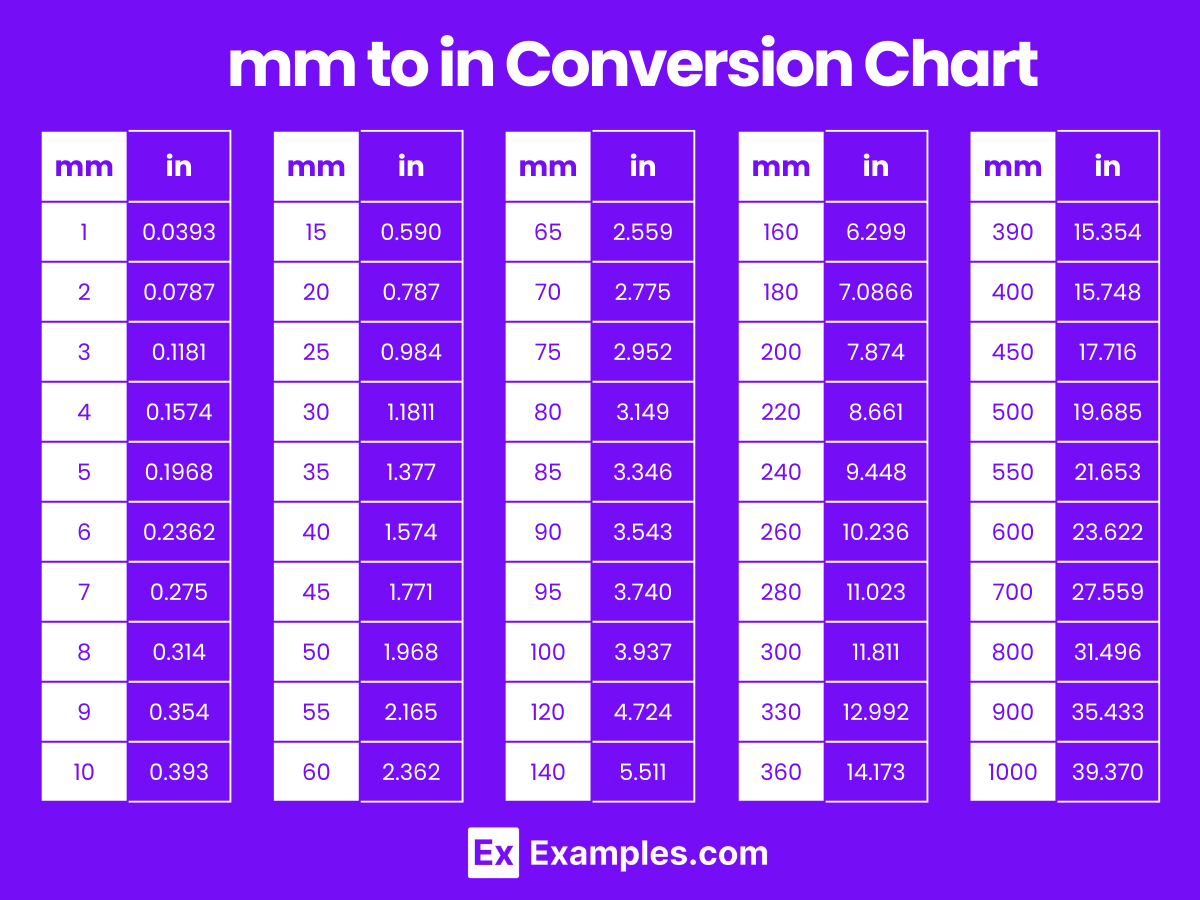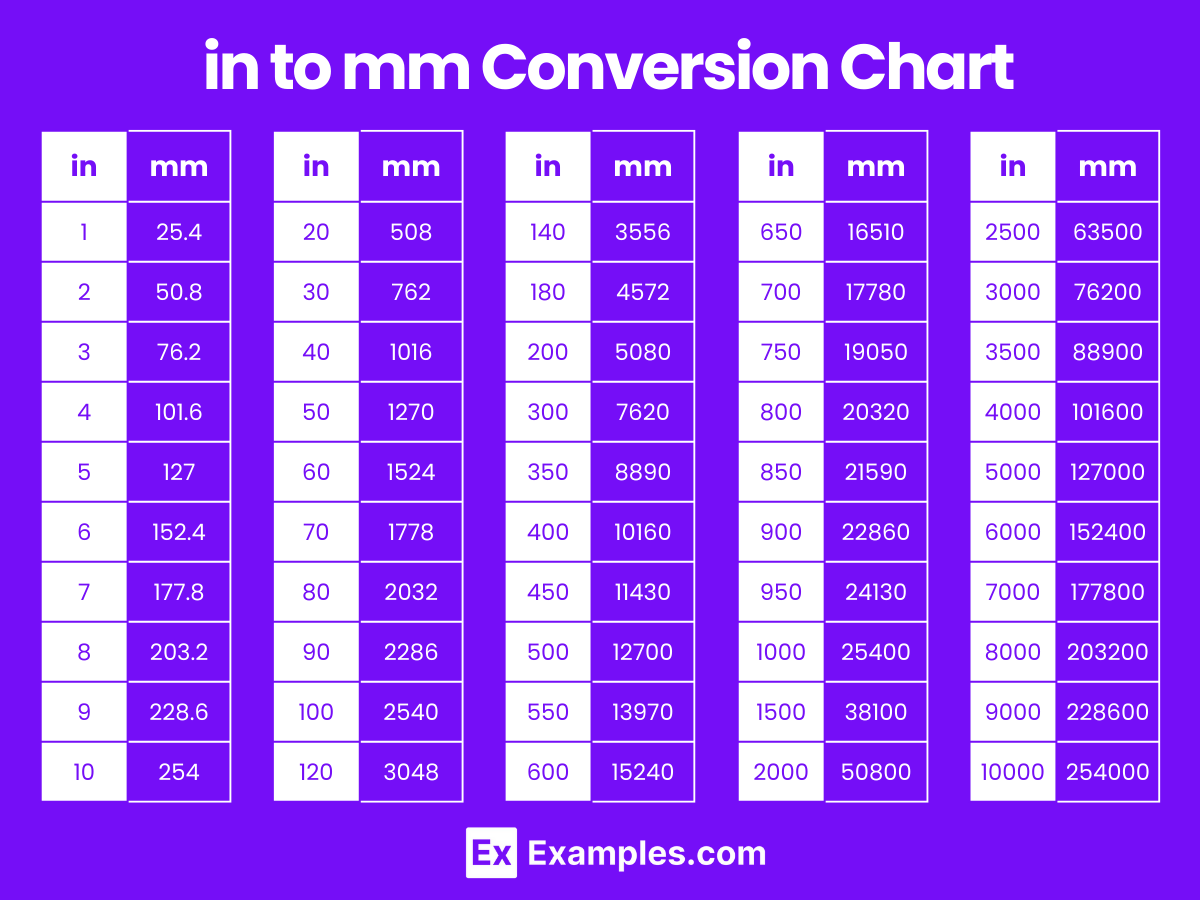Instantly convert millimeters to inches on Examples.com. Just enter your measurement for immediate conversion results.
mm to inch
Formula: Length in Inches (inch) = Length in Millimeters (mm) / 25.4
Millimeter:
Inch:
| Millimeters | Inches |
|---|---|
| 1 | 0.03937007874015748 |
inch to mm
Formula: Length in Millimeters (mm) = Length in Inches (inch) × 25.4
Inch :
Millimeter :
| Inches | Millimeters |
|---|---|
| 1 | 25.4 |

Length Converters to Millimeter (mm)
Length Converters to Inch (in)
| Kilometer to Inch | Meter to Inch | Centimeter to Inch |
| Millimeter to Inch | Micrometer to Inch | Nanometer to Inch |
| Mile to Inch | Yard to Inch | Feet to Inch |
| Nautical Mile to Inch |
How to Convert Millimeter to Inch
To convert millimeter to inches, divide the number of millimeters by 25.4.
Inches = Millimeters / 25.4
1mm = 0.03937007874015748 inches
1 inch = 25.4 mm
Lets Convert 2000 millimeters to inches.
Inches = 2000 / 25.4 ≈ 78.7402 inches
How to Convert Inches to Millimeters:
To convert inches to millimeters, multiply the number of inch by 25.4.
Millimeters = Inches × 25.4
Lets Convert 3 inches to millimeters.
Millimeters = 3 × 25.4 = 76.2 millimeters
Millimeter to Inch Conversion Table
| Millimeters (mm) | Inches (in) |
|---|---|
| 1 mm | 0.03937 in |
| 2 mm | 0.07874 in |
| 3 mm | 0.11811 in |
| 4 mm | 0.15748 in |
| 5 mm | 0.19685 in |
| 6 mm | 0.23622 in |
| 7 mm | 0.27559 in |
| 8 mm | 0.31496 in |
| 9 mm | 0.35433 in |
| 10 mm | 0.39370 in |
| 20 mm | 0.78740 in |
| 30 mm | 1.1811 in |
| 40 mm | 1.5748 in |
| 50 mm | 1.9685 in |
| 60 mm | 2.3622 in |
| 70 mm | 2.7559 in |
| 80 mm | 3.1496 in |
| 90 mm | 3.5433 in |
| 100 mm | 3.9370 in |
mm to in Conversion Chart

Inch to Millimeter Conversion Table
| Inches (in) | Millimeters (mm) |
|---|---|
| 1 in | 25.4 mm |
| 2 in | 50.8 mm |
| 3 in | 76.2 mm |
| 4 in | 101.6 mm |
| 5 in | 127.0 mm |
| 6 in | 152.4 mm |
| 7 in | 177.8 mm |
| 8 in | 203.2 mm |
| 9 in | 228.6 mm |
| 10 in | 254.0 mm |
| 20 in | 508.0 mm |
| 30 in | 762.0 mm |
| 40 in | 1016.0 mm |
| 50 in | 1270.0 mm |
| 60 in | 1524.0 mm |
| 70 in | 1778.0 mm |
| 80 in | 2032.0 mm |
| 90 in | 2286.0 mm |
| 100 in | 2540.0 mm |
in to mm Conversion Chart
Difference Between Millimeter to Inch
| Aspect | Millimeter (mm) | Inch (in) |
|---|---|---|
| System | Metric System | Imperial and US Customary Systems |
| Definition | One thousandth of a meter (1 mm = 1/1000 m) | One twelfth of a foot (1 in = 1/12 ft) |
| Conversion Factor | 1 inch = 25.4 mm | 1 mm = 0.03937 inches |
| Origin | From the French “millimètre”, introduced in the 1790s. | Derived from the Roman “uncia”, which was 1/12 of a Roman foot |
| Precision | Generally used when high precision is needed in smaller measurements. | Commonly used in situations requiring less precise measurements in everyday use. |
| Typical Uses | Engineering, science, medicine—where precise measurements are crucial. | Construction, everyday objects, TV screens, fabric length. |
1. Solved Examples on Converting Millimeter to Inch
Example 1: Convert 10 mm to Inches
10 mm / 25.4 = 0.3937 inches
Result: 10 mm is approximately 0.3937 inches.
Example 2: Convert 85 mm to Inches
85 mm / 25.4 = 3.3465 inches
Result: 85 mm is approximately 3.3465 inches.
Example 3: Convert 200 mm to Inches
200 mm / 25.4 = 7.8740 inches
Result: 200 mm equals about 7.8740 inches.
Example 4: Convert 456 mm to Inches
456 mm / 25.4 = 17.9528 inches
Result: 456 mm is approximately 17.9528 inches.
Example 5: Convert 1220 mm to Inches
1220 mm / 25.4 = 48.0315 inches
Result: 1220 mm equals about 48.0315 inches.
2. Solved Examples on Converting Inch to Millimeter
Example 1: Convert 1 inch to Millimeters
1 inch × 25.4 = 25.4 mm
Result: 1 inch is exactly 25.4 mm.
Example 2: Convert 5 inches to Millimeters
5 inches × 25.4 = 127 mm
Result: 5 inches is 127 mm.
Example 3: Convert 3.5 inches to Millimeters
3.5 inches × 25.4 = 88.9 mm
Result: 3.5 inches equals 88.9 mm.
Example 4: Convert 12 inches to Millimeters
12 inches × 25.4 = 304.8 mm
Result: 12 inches is 304.8 mm.
Example 5: Convert 24.75 inches to Millimeters
24.75 inches × 25.4 = 628.65 mm
Result: 24.75 inches equals 628.65 mm.
1. What is the conversion factor from millimeters to inches?
The conversion factor from millimeters to inches is approximately 0.0393701. This means that there are about 0.0393701 inches in a millimeter.
2. Why is 1 inch defined as 25.4 millimeters?
The definition of an inch as 25.4 millimeters was established in 1959 by an international agreement to standardize the inch for industrial and scientific purposes, aligning the inch more closely with the metric system for consistency across countries.
3. Is there a simple way to remember how to convert millimeters to inches?
A quick method to estimate the conversion is to remember that 25 mm is approximately 1 inch. So, dividing the number of millimeters by 25 gives a rough approximation of the inches.
4. What should I do if I need to convert a large number of millimeters to inches?
For large conversions, it might be practical to use a spreadsheet like Microsoft Excel or Google Sheets, where you can apply the conversion formula across multiple values automatically and ensure accuracy without manual calculations.
5. How accurate is the conversion from millimeters to inches?
The conversion is highly accurate when using the exact factor of 25.4. However, for quick estimations, rounding to 25 may introduce a small error but is often sufficient for non-precision tasks.
6. Is 20 mm the same as 1 inch?
No, 20 mm is not the same as 1 inch. To convert millimeters to inches, you divide by 25.4. Therefore, 20 mm equals approximately 0.7874 inches, which is less than an inch.
7. What does 8mm look like in inches?
To find out what 8 mm looks like in inches, you divide by 25.4. So, 8 mm is about 0.3150 inches. This is a little less than one-third of an inch.
8. Which is bigger 1 inch or 25 mm?
1 inch is slightly larger than 25 mm. Since 1 inch equals 25.4 mm, it is 0.4 mm longer than 25 mm. This difference, although small, makes 1 inch the larger measurement.


